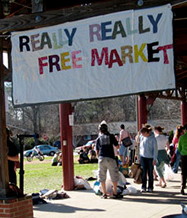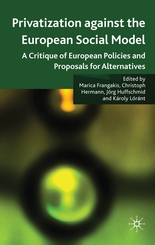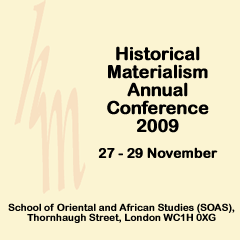General
Commons in turbulent times
 After several decades of relentless neoliberal enclosures, the idea of ‘commons’ is enjoying a renaissance amongst some neo-Keynesian economists and commentators, while political scientist Elinor Ostrom has just been award the Nobel prize ‘for her analysis of economic governance, especially the commons’. Massimo De Angelis explains why capital’s commons will always be distorted – because they are based upon social injustice – and why we can only reclaim the commons from capital by constructing common interests. Read more about the tragedy of the capitalist commons
After several decades of relentless neoliberal enclosures, the idea of ‘commons’ is enjoying a renaissance amongst some neo-Keynesian economists and commentators, while political scientist Elinor Ostrom has just been award the Nobel prize ‘for her analysis of economic governance, especially the commons’. Massimo De Angelis explains why capital’s commons will always be distorted – because they are based upon social injustice – and why we can only reclaim the commons from capital by constructing common interests. Read more about the tragedy of the capitalist commons
If the cell form of capitalism is the commodity, the cellular form of a society beyond capital is the common. Nick Dyer-Witheford discusses the circulation of commons and the conditions they would create for new collective projects and waves of organising. Read more about Commonism
Gift Economy: The Really Really Free Market
 According to the capitalist lexicon, the “Free Market” is the economic system in which prices are determined by unrestricted competition between privately owned businesses. Any sensible person can recognize immediately that neither human beings nor resources are free in such a system; hence, a “Really Really Free Market” is a market that operates according to gift economics, in which nothing is for sale and the only rule is share and share alike. In the interest of not taxing the reader’s patience, a single apostrophe stands in for the two “Really”s throughout this text. Read more
According to the capitalist lexicon, the “Free Market” is the economic system in which prices are determined by unrestricted competition between privately owned businesses. Any sensible person can recognize immediately that neither human beings nor resources are free in such a system; hence, a “Really Really Free Market” is a market that operates according to gift economics, in which nothing is for sale and the only rule is share and share alike. In the interest of not taxing the reader’s patience, a single apostrophe stands in for the two “Really”s throughout this text. Read more
PRESOM: Project is over
 There are no more conferences. The final product of the CA PRESOM is the book: Privatisation against the European Social Model – A critique of European policies and proposals for alternatives, Palgrave Macmillan, Houndmills, Basingstoke, UK, November 2009.
There are no more conferences. The final product of the CA PRESOM is the book: Privatisation against the European Social Model – A critique of European policies and proposals for alternatives, Palgrave Macmillan, Houndmills, Basingstoke, UK, November 2009.
Feral vs. capitalist trade
Feral Trade is a public experiment trading goods over social networks. The use of the word ‘feral’ describes a process which is wilfully wild (as in pigeon) as opposed to romantically or nature-wild (wolf). The passage of goods can open up wormholes between diverse social settings, routes along which other information, techniques or individuals can potentially travel. Read more
Open Cola and Cube Cola
 The principle of Open Source now set Cola free from monopolist capital. It was reconstructed via reverse ingeneering, published as Open Cola under the GPL and since then optimized by global community under the conditions of free cooperation. One of the approaches is Cube Cola: Besides working on the recipe a group of artists from the “Cube” in Bristol produces “information material” like a poster and a tea towel with the recipe, as well as a hand book and a set of tools necessary for the production of free cola. Finally it is distributed besides other goods via Feral Trade Courier. That is a live shipping database for a freight network running outside commercial systems. The database offers dedicated tracking of feral trade products in circulation, archives every shipment and generates freight documents on the fly.
The principle of Open Source now set Cola free from monopolist capital. It was reconstructed via reverse ingeneering, published as Open Cola under the GPL and since then optimized by global community under the conditions of free cooperation. One of the approaches is Cube Cola: Besides working on the recipe a group of artists from the “Cube” in Bristol produces “information material” like a poster and a tea towel with the recipe, as well as a hand book and a set of tools necessary for the production of free cola. Finally it is distributed besides other goods via Feral Trade Courier. That is a live shipping database for a freight network running outside commercial systems. The database offers dedicated tracking of feral trade products in circulation, archives every shipment and generates freight documents on the fly.
Prokla available online
Prokla (Probleme des Klassenkampfes/problems of class struggle), one of the leading and long standing unorthodox Marxist journals in Germany, is now available from the internet. The older issues from 1971 to 2006 are even freely accessible. Of course Prokla as all left journals is dependent on subscriptions. Check out www.prokla.de
Conference: Surviving in the »Creative Industries«
 The »Creative Industries« are considered key to the city development in the 21st Century. Cities such as Berlin put them at the center of image and location policy. The debates are mainly of benefit to the economy and capital development at the forefront – the changed living and working conditions of creative people are in contrast scarcely taken into view. They will be the topic of the congress. The digital revolution in production and distribution, the struggles for intellectual property and realization rights, more flexible corporate structures and labour relations, the project form of work and the privatization of cultural institutions have changed jobs and lifestyles as subjectivities. An unwieldy number of opportunities face enormous competition for jobs and contracts, increased chances of expression the pressure of conformity by the market, more self-determination the self-exploitation in informal and precarious employment relationships and with unfettered income at the same time. Read more
The »Creative Industries« are considered key to the city development in the 21st Century. Cities such as Berlin put them at the center of image and location policy. The debates are mainly of benefit to the economy and capital development at the forefront – the changed living and working conditions of creative people are in contrast scarcely taken into view. They will be the topic of the congress. The digital revolution in production and distribution, the struggles for intellectual property and realization rights, more flexible corporate structures and labour relations, the project form of work and the privatization of cultural institutions have changed jobs and lifestyles as subjectivities. An unwieldy number of opportunities face enormous competition for jobs and contracts, increased chances of expression the pressure of conformity by the market, more self-determination the self-exploitation in informal and precarious employment relationships and with unfettered income at the same time. Read more
Anual ppg-network conference in London

State projects between neoliberal restauration and ‘postneoliberalism’
(ppg-network and RLS in cooperation with the University of Vienna and Historical Materialism) at Historical Materialism in London, 27.-29.11.09, School of Oriental and African Studies (SOAS), Thornhaugh Street, London WC1H OXG.
Read more | ›››
Book: China’s new place in a world in crisis
Summary: The world and China’s place in it have been transformed over the past year. The pressures for change have come from the most severe global financial crisis ever. The crisis has accelerated China’s emergence as a great power. But China and its global partners have yet to think or work through the consequences of its new position for the governance of world affairs. China’s New Place in a World in Crisis discusses and provides in-depth analysis of the following questions. How have China’s growth prospects been affected by the global crisis? How will the crisis and China’s response to it impact China’s major domestic issues, such as industrialisation, urbanisation and the reform of the state-owned sector of the economy? How will the crisis and the international community’s response to it affect the rapidly emerging new international order? What will be China’s, and other major developing countries’, new role? Can China and the world find a way of breaking the nexus between economic growth and environmental sustainability — especially on the issue of climate change? Download 486 pages PDF or view China Whole Book on Scribd
What is the Common? An International Conference
Gothenburg, Sweden: “The Kurrents‘” program for 2009 is organized under the title “What Is the Common?”. It is again a co-organized event together with invited artists, researchers and internationally leading intellectuals. The intention is to investigate different axes related to the common as both a real force and an idea. As such the common permeates such diversified domains as artistic practice, law, economy and gender relations.
From the Call for Papers:
In the shadow of the global crisis of capitalism, the common, somehow obliterated in the recent past, has emerged as an indispensable and central notion. The conference addresses this notion both as a real movement and as an already present horizon, a dynamic principle, for societal life. It is a critical topic today, not only because the public, administrated by the state, is reduced to expendable assets for regulating a supposedly self-regulating machine called Market, but more importantly because the emerging forms of the common impose themselves with an unprecedented acuity and in opposition to the doxa of the private property.
Health and healthcare under capitalism…
is the topic of Socialist Register’s, “the intellectual lodestone for the international Left since 1964”, 2010 volume. More than a dozen articles, see the table of content for more.
Re-Municipalization newly discovered, again
What Has Free Software Got to Do with Patents on Pigs?
 Munich, Germany. Marienplatz. Richard Stallman will speak at a joint rally against bio- and software patents in front of the European Patent Office. Read more at No Patents on Seeds and about the action day in Bavaria on April 15th (in German)
Munich, Germany. Marienplatz. Richard Stallman will speak at a joint rally against bio- and software patents in front of the European Patent Office. Read more at No Patents on Seeds and about the action day in Bavaria on April 15th (in German)
Creative Commons: The sound of Berlin
Berlincast.com was launched by Yukio Van Maren King in June of 2005 as a platform to list some recordings of different public spaces in Berlin. The sounds are published under a Creative Commons license and can be downloaded and remixed.Hear more
